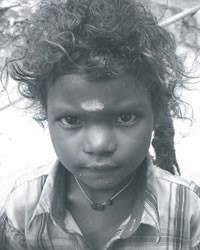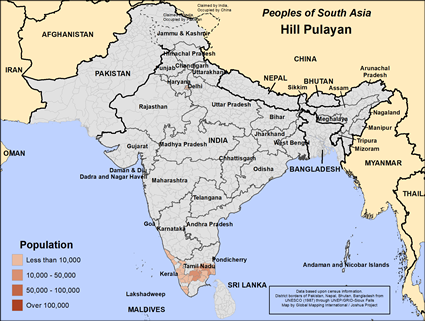Hill Pulayan in India

Photo Source:
Anonymous
|

Map Source:
People Group data: Omid. Map geography: UNESCO / GMI. Map Design: Joshua Project.
|
| People Name: | Hill Pulayan |
| Country: | India |
| 10/40 Window: | Yes |
| Population: | 102,000 |
| World Population: | 102,000 |
| Primary Language: | Tamil |
| Primary Religion: | Hinduism |
| Christian Adherents: | 0.47 % |
| Evangelicals: | 0.00 % |
| Scripture: | Complete Bible |
| Ministry Resources: | Yes |
| Jesus Film: | Yes |
| Audio Recordings: | Yes |
| People Cluster: | South Asia Tribal - other |
| Affinity Bloc: | South Asian Peoples |
| Progress Level: |
|
Introduction / History
The Hill Pulayan is a tribal people who have lived in south India for over 6000 years. Their name means one who tills the soil. When the Dravidians arrived four thousand years ago, they blended with the Pulayan to become one people. The Aryans conquered the land in the 9th century AD.
Over the years, the Pulayan were deprived of their land and became virtual slaves to the upper castes. The British outlawed slavery in 1855 but this did little to improve the economic or social conditions of the Pulayan. As late as 1900, the Pulayans were not able to attend government schools or enter Hindu temples.
The Pulayan are a Scheduled Caste, meaning they are eligible for special preference in public jobs and university positions. Most Pulayan work as laborers in rice paddies on land they do not own. They also raise goats and collect forest products. Both men and women chew betel, a nut that colors the teeth a distinctive black.
Unfortunately, they are still denied the use of public wells in many areas of south India. Most Pulayan cannot read of write. The main language of the Pulayan is Tamil.
Where Are they Located?
The Hill Pulayan live in Tamil Nadu. A smaller group lives in Kerala.
What Are Their Lives Like?
The lives of the Hill Pulayan are very challenging even in modern India. The caste system operates in rural areas where the Pulayan reside. The Pulayan suffer from discrimination from the Hindu caste members. They are seen as having low status and that everything Pulayan touch is unclean. The Indian government is taking actions against this discrimination but traditions of hundreds of years change slowly in the Indian countryside.
The Pulayans live in mud huts in the forest away from Indian villages. Most do not have electricity, access to clean water or indoors plumbing.
The Pulayans marry within their group. They have their own priests for life ceremonies. They had their own groves and shrines for worship.
The Pulayan are not vegetarians and their main foods are rice, lentils and vegetables. Meat is a luxury only for holidays or feasts.
What Are Their Beliefs?
The Hill Pulayan practice Hinduism, strongly influenced by folk religion. They worship and serve the gods of the Hindu pantheon, especially Shiva, the destroyer god and Kali, the goddess of death and sexuality. Hindus believe that by performing rituals and good works that they will attain moksha or freedom from the endless cycle of birth, death and rebirth. The Pulayan visit their shrines and offer prayers, food, flowers and incense to their gods. They believe they must appease evil spirits and their ancestors.
The main yearly holidays of the Hill Pulayan people are Holi, the festival of colors, Diwali, the festival of lights and Navratri, the celebration of autumn.
What Are Their Needs?
The Pulayan have many pressing needs. They need most of all to hear the life-changing message of Jesus Christ who can free them from their sins. The Hill Pulayan need help in educating their children, training in job skills and in gaining access to clean water.
Prayer Points
Pray the Lord sends Christians workers to help the Pulayan see the love and mercy of Christ in action.
Pray that God opens the heart of Hill Pulayan families to respond the good news about Christ.
Pray the Pulayan people will understand that Jesus desires to bless Pulayan families and communities, not harm them.
Pray that the small number of Pulayan Christians might be trained to share the gospel with their brothers and sisters.